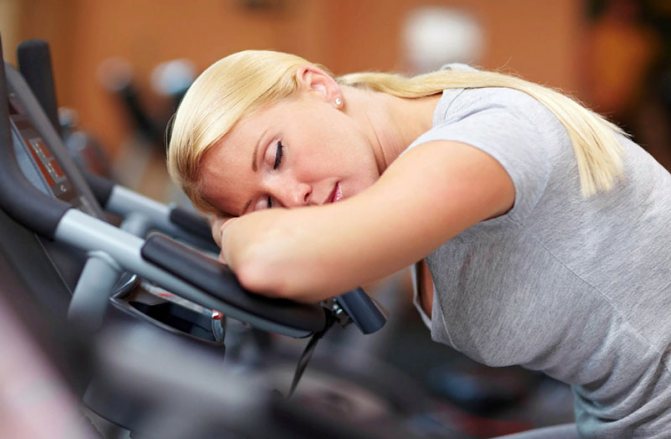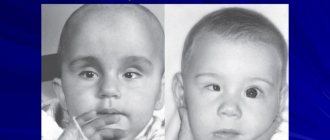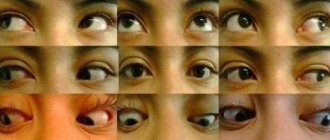Constant nervous tension, poor diet and lack of physical activity negatively affect the health of modern people. Depressive syndrome is a common problem faced by patients of all ages. It is accompanied by oppression and a lack of desire to lead an active social and personal life. In some cases, mental disorder becomes the cause of suicidal thoughts and actions. If you experience symptoms of depression, it is recommended to consult a doctor. It is important to exclude the somatic etiology of the problem, since it is also possible.
Types of manic-depressive syndrome
Based on specific characteristics, depressive syndrome is divided into manic-depressive, asthenic-depressive and anxiety-depressive. Manic-depressive syndrome is characterized by an unstable psycho-emotional background with periods of excessive depression, followed by extremely excited states, while the phases of depression are much longer than the manic phases. There are two types of syndrome with manic-depressive manifestations. In the first type, strong signs of depression can be combined with at least one full-fledged manifestation of the excited state phase, the second type - with very rare observation of complete episodes of this phase. Mild forms of this disease with low manifestations of both phases, called cyclothymia, may also occur.
Signs, treatment of manic-depressive syndrome
The manic phase is characterized by the following symptoms of depressive syndrome:
- Inability to adequately control one's actions;
- Excessive energy;
- Impaired concentration;
- Active gestures;
- Overeating, excessive alcohol consumption;
- Extreme excitability and irritability.
During this period, a patient with depressive syndrome cannot objectively assess his capabilities; sometimes he creates the illusion of his own genius, unrecognized by others.
Signs of the depressive phase are:
- Apathy;
- Fast fatiguability;
- Depressed and sad mood;
- Low self-esteem;
- Insomnia;
- Slowness and stiffness of movements;
- Problems with memory and concentration;
- Feelings of hopelessness and thoughts of death.
In severe forms of the disease and suicidal tendencies, treatment of depressive syndrome takes place in a hospital setting with the use of antidepressants, mood stabilizers, benzodiazepines, and antipsychotic drugs.
Astheno-depressive syndrome
The causes of astheno-depressive syndrome can be external and internal factors, the latter including unstable psycho-emotional states provoked by various stressful situations. External causes include diseases that worsen the quality of life - cancer, operations, injuries, chronic illnesses, etc. Symptoms of this type of depressive syndrome are:
- Irritability;
- Excessive sensitivity;
- Fast fatiguability;
- Slowness of thought and speech;
- Feeling of exhaustion and general weakness.
With a long-term illness, gloomy assessments of one’s condition and forecasts for the future appear that do not correspond to reality. Against the background of depression, gastrointestinal dysfunction, high blood pressure, sleep disorders, menstrual irregularities, lack of sexual desire, weight loss, etc. may appear. A distinctive feature of the pathology is the improvement of the patient’s well-being and the disappearance of many signs of the syndrome after proper rest or the elimination of symptoms of somatic diseases.
In addition to the above-listed signs of asthenic-depressive syndrome, adolescents and young people may experience a guilt complex, problems with the perception of the surrounding reality, anger, rudeness, hysterics and unreasonable protests. Treatment of depressive syndrome in this case depends on the clinical picture of the disease; courses of psychotherapy are usually prescribed, and, if necessary, antidepressants and sedatives.
Anxiety-depressive syndrome
Manifestations of anxiety-depressive syndrome, as its name suggests, are anxiety, excessive tension and all kinds of phobias. This type of depression most often occurs in adolescence, with inferiority complexes, emotional instability, vulnerability and self-doubt characteristic of this period. Depressive syndrome at the onset of the disease can be expressed by various painful anxieties and fears, which, as the pathology develops, without proper treatment, can transform into panic fears. Teenagers most of all fear for their own lives and the well-being of loved ones, they are wary of punishment (often completely unreasonably) for various offenses, for their imaginary ugliness, lack of talent, abilities, etc., they are afraid of experiencing humiliation in front of other people. These manifestations are often accompanied by rapid heartbeat, dizziness, dry mouth, and increased sweating. In severe cases of the disease, associated with the loss of an objective assessment of the surrounding world and the place of one’s personality in it, persecution mania may also arise. Treatment of anxiety-depressive syndrome includes the use of adrenergic blockers, antidepressants and tranquilizers.
Take care of your health and the health of your family; at the first signs of depressive syndrome, contact a specialist. With timely and effective therapy, patients with this disease have the opportunity to lead a full, normal lifestyle, work and have a family.
Despite wide access to information, many people are extremely skeptical about mental health disorders. Most perceive only those mental illnesses that require hospital treatment and the use of serious medications, and neuroses, depression, phobias and panic attacks are perceived by them as a whim. But this approach is fraught with serious problems, because patients with the listed disorders need qualified help no less than patients with schizophrenia and manic-depressive psychosis. One of the fairly common pathological conditions associated with mental disorders includes astheno-depressive syndrome, symptoms and treatment; we will discuss it in a little more detail.
Astheno-depressive syndrome is a fairly common mental disorder that combines manifestations of asthenia and depression. Doctors often classify it as mild depression with severe manifestations of asthenia. A similar condition is quite often observed in patients with somatic diseases, neuroses and cyclothymia (a mild type of manic-depressive psychosis).
Symptoms of astheno-depressive syndrome
Astheno-depressive syndrome has quite extensive symptoms. Some people experience only some of the symptoms of this disease, while others may be concerned about all possible manifestations of this disorder.
Most often, astheno-depressive syndrome makes itself felt by a loss of interest in life. The patient does not want to do anything at all, does not want to go out anywhere, and nothing captivates him. Quite often, this disorder leads to irritability and can cause aggression even over minor trifles. Patients with this problem find it difficult to complete what they start; they are bothered by frequent mood swings (usually there is an alternation of apathy and uncontrollable talkativeness). Also, patients with asthenic-depressive syndrome find it difficult to concentrate on anything; they may develop a variety of phobias, the signs of which were not previously present (for example, social phobia, claustrophobia), and they may also experience attacks of causeless fear and panic. Quite often, this disorder leads to a lack of appetite or, on the contrary, provokes irrepressible gluttony.
Astheno-depressive syndrome is usually accompanied by sleep disturbances. The patient has difficulty falling asleep, and it is even more difficult to wake up and get out of bed (even if the duration of the night's rest was sufficient).
In addition, this mental disorder is accompanied by the appearance of a number of physiological symptoms, represented by headaches, attacks of tachycardia, shortness of breath and sweating, dizziness and nausea. The patient's temperature may rise to subfebrile levels, menstrual irregularities are also characteristic, and in men - impotence. Quite often, astheno-depressive syndrome accompanies gastrointestinal disorder.
In some cases, people with this disorder complain of the appearance of so-called mythical body pains, which each time appear in different parts of the body and joints.
How is astheno-depressive syndrome corrected, what treatment is effective?
Therapy for asthenic-depressive syndrome depends on what factors caused its development. If the symptoms are explained by the presence of somatic diseases, their appropriate correction is carried out.
In the absence of serious physical health problems, you cannot do without the help of a psychiatrist. Self-medication is not indicated in this case, since the doctor will first assess the patient’s health characteristics, then select medications based on individual characteristics, and suggest how best to change lifestyle.
A variety of medications can be used to correct asthenic-depressive syndrome. In some cases, the doctor can prescribe antidepressants, which will effectively lift the patient out of a depressed state, help him reconsider the causes of such a disorder and eliminate them. Therapy can also be carried out using milder drugs, including herbal ones. The drugs of choice are usually sedatives (tincture of peony, hawthorn, motherwort, valerian, Novo-passit, etc.), as well as adaptogen drugs (based on eleutherococcus, ginseng, aralia, etc.), the dosage, frequency of administration and duration of treatment are selected also on an individual basis.
All patients with astheno-depressive syndrome need to create the correct daily routine, adhere to a diet and ensure sufficient physical activity.
The patient’s diet should not contain overtly harmful foods (fatty, fried, spicy and canned foods); it is also worth reducing the consumption of sweets and starchy foods. It is better to fill the menu with cereals, nuts, dried fruits and legumes; it is also recommended to eat lean meat, eggs, dairy products, vegetables, fruits and berries in significant quantities.
To successfully eliminate astheno-depressive syndrome, you should accustom yourself to walk in the evenings, sign up for swimming or dancing, and also perform simple sets of therapeutic exercises. Breathing exercises or yoga, as well as aromatherapy, herbal medicine and auto-training will give an excellent effect.
If you suspect the development of astheno-depressive syndrome in yourself or your loved ones, it is better not to delay and seek medical help from a qualified psychotherapist.
Astheno-depressive syndrome - folk remedies
Medicines based on herbs and improvised means will help to cope with astheno-depressive syndrome. So, an excellent effect is achieved by using a mixture that includes thyme herb (a teaspoon), lemon balm herb (a tablespoon), peppermint leaves (a tablespoon), black currant leaves (a tablespoon) and black long tea leaves (a couple of tablespoons).
Brew a teaspoon of this mixture with a glass of boiling water and leave under the lid for twenty minutes. Drink the strained drink like tea three times a day.
The reason for the emergence of the term was the difficulty of differential diagnosis between depression and asthenia. The prefix “astheno” (from the Greek asthenēs) - translated means weak, exhausted. This syndrome is a kind of symbiosis of asthenia and depression. This disorder should not be confused with asthenovegetative or asthenoneurotic syndromes, which are diseases of a completely different kind.
Thus, astheno-depressive syndrome is a shallow depression in which the symptoms of asthenia (chronic fatigue syndrome) are most pronounced. Often found in somatic diseases, neuroses and cyclothymia (mild form).
General symptoms
With anxious depression, a person constantly feels depressed and is also tormented by unexplained anxiety.
With anxious depression, the symptoms are varied and manifest with varying intensity in different patients. In general, the disorder is characterized by symptoms of depression and anxiety disorder, to which are added a number of somatic manifestations of the disease.
Common clinical symptoms of anxious depression:
- depressed state;
- loss of interest in life;
- feeling of hopelessness, loss of direction in life;
- sleep disorders;
- anhedonia;
- constant fatigue;
- general physical tension;
- groundless fear and anxiety;
- decreased self-esteem;
- tendency to self-flagellation;
- development of complexes and phobias;
- suicidal thoughts.
Anxious depression syndrome can be expressed in different ways. In mild forms of the disorder, the patient’s ability to work does not suffer. The patient can perform everyday tasks, but this is accompanied by severe fatigue and drowsiness. Interest in professional activities weakens, the ability to enjoy life is lost.
In severe cases, a person cannot engage in professional activities due to lack of vital energy.
Sleep disturbances in anxious depression can include both insomnia and an increased need for sleep. Patients often begin to sleep 10-12 hours a day, and upon awakening they feel tired, weak, and drowsiness does not go away during the day.
With anxious depression, people often face a guilt complex. Patients complain of a feeling of worthlessness, which leads to inaction. It is interesting that the ability to evaluate one’s actions as a whole does not disappear; personality changes are not observed during anxious depression, so patients are fully aware of their actions.
Somatic or bodily signs of anxious depression are associated with increased production of adrenaline and are much like the state of a person during a panic attack. Typical symptoms:
- increased heart rate;
- throbbing headache (tension cephalalgia);
- hand tremors;
- weakness of the muscles of the lower extremities;
- dizziness;
- lack of air;
- disorientation;
- feeling of a lump in the throat;
- dry mouth;
- heavy sweating;
- discomfort in the stomach.
Such physical manifestations of depression are often mistaken for vegetative-vascular dystonia. The appearance of such symptoms in general is a disruption of the autonomic nervous system against the background of its general exhaustion.
In addition to the symptoms listed, patients often complain of decreased appetite and sudden weight loss.

The disorder is manifested by severe self-doubt and a feeling of insignificance
Anxious depression is a state of psychomotor agitation with manifestations of an affective disorder and a pronounced feeling of anxiety. In other words, a person feels internal tension, fear and increasing anxiety, which is why he literally cannot find a place for himself. With anxious depression, patients often tend to repeat some obsessive movements - pacing the room, cracking their knuckles, biting their nails. Such actions allow you to take a little break from the tormenting anxiety.
As a rule, fear arises not for oneself, but for one’s loved ones. A person is afraid that something bad will definitely happen to one of his relatives. Many patients engage in self-flagellation, remembering all their misdeeds and wrong actions in the past.
Anxious depression can be accompanied by a number of syndromes or take the following forms:
- hypochondriacal;
- somatized;
- obsessive.
Hypochondriacal syndrome is characterized by a general state of depression and fear for one’s own life. The patient's anxiety is associated with the fear of contracting a dangerous disease that will inevitably lead to premature death. Such patients often develop new symptoms and complain of so-called phantom pain.
The somatized form of depression is manifested by severe anxiety disorder and somatic anxiety. The patient experiences typical symptoms of increased adrenaline levels - hand tremors, shortness of breath, increased heart rate. Against the background of this disorder, autonomic disorders often occur and endocrine disorders develop.
Anxious depression with obsessive states is manifested by strong self-doubt, the development of complexes, phobias, and a sense of one’s own insignificance. A person becomes fixated on his own actions and constantly analyzes the past. Wrong conclusions are drawn, which is why the patient seriously fears for his future life.
Causes and manifestations of astheno-depressive syndrome
Experts call the main reasons that cause astheno-depressive syndrome long-term psychotraumatic circumstances in a person’s life that arise against the background of mental stress. Other sources of distress may include:
- Traumatic brain injuries.
- Avitaminosis.
- Sedentary lifestyle.
- Decreased immunity.
- Thyroid gland dysfunction.
- Diseases of the cardiovascular system.
- Slagging of the body.
- Poor absorption or insufficient dietary intake of minerals.
As in the case of depression, astheno-depressive syndrome has primary and secondary symptoms. Pathological changes in mood, disturbances in the rhythm of sleep and wakefulness, weakening of psychomotor functions come to the fore in this case. Other symptoms of the disorder that may well indicate its presence:
- Increased vulnerability.
- Rapid depletion.
- Weakness.
- Lethargy.
- Distraction of attention.
- Various sleep disorders (insomnia, prolonged sleep).
- Distractibility.
- Hypersensitivity.
- Emotional lability (mood instability).
- Decreased libido.
- Slowing down the pace of thinking.
The main causes of asthenic depression

Most often, according to experts, asthenic depression is diagnosed in healthy people who have had to endure prolonged emotional and mental overload. The true cause that triggers the disease remains unknown.
Perhaps these are the factors that contribute to physical or nervous exhaustion, namely:
- chronic overfatigue, clearly manifested in physically weak children of middle age and adolescence;
- acute inflammatory infections;
- diseases such as anemia, arthritis, tumors and others that have a negative effect on the central nervous system;
- various intoxications;
- suspiciousness, high susceptibility.
Poor food choices are often to blame for a person’s poor health. From a lack of proteins and fats, essential microelements, minerals and vitamins, the central nervous system primarily suffers and the general condition of the body worsens.
Risk group
- People suffering from chronic inflammatory diseases: gastritis, duodenitis, cholecystitis, nephritis.
- Representatives of the mass intelligentsia and creative professions: doctors, teachers, journalists, constructors, designers, directors.
- People holding high management positions: their work activities are associated with high nervous stress and great responsibility.
Astheno-depressive syndrome poses a significant danger to a person’s mental health. And not so much because in most cases it becomes a source of decreased performance and social activity, but because ignoring it can lead to the development of more complex and deeper ones. The syndrome requires certain treatment.
How to help a person?
There are no clear rules for the treatment of asthenic-depressive syndrome. After a diagnosis has been made, a mandatory consultation with a psychotherapist or psychologist is indicated.
If a disease is suspected, it is necessary to exclude multiple sclerosis, diabetes, autoimmune thyroiditis, exacerbations of previously diagnosed chronic disorders, systemic connective tissue pathologies, and prescribe antidepressants.
Choose those drugs that have a minimum number of side effects.
As a result of recent experiments and studies, the majority of those suffering from astheno-depressive syndrome were infected with the Epstein-Barr and HHV-6 viruses, which indicates a disruption in the regulation of anti-stress systems associated with immune disorders in patients.
As a result of prescribing antiviral treatment with Valtrex along with immunotropic therapy, the patients' condition improved significantly.
Doctor of Pedagogical Sciences V.D. Kryazhev (corresponding member of the Russian Academy of Natural Sciences, head of the department of the All-Russian Research Institute of Physical Education) to overcome stress, recommends recharging the body’s “accumulators” by performing yoga breathing exercises in the morning, in the afternoon before meals or in the evening to restore energy. Systematic exercises increase lung capacity, relieve stress and strengthen strength.
Article on the topic: Aspecard - instructions for use, indications, composition, side effects and analogues
To overcome a depressive state, walks in clean air, vitamin-rich nutrition, and water procedures are recommended.
It is important to follow a routine, stick to certain hours for sleep. Yoga classes are recommended.
Self-guided steps to healing
It is quite possible to overcome the disease without resorting to outside help. To do this, you must follow the following practical recommendations.
- Adjust your diet, eat less fatty and fried foods. Be sure to take vitamins and mild sedatives.
- Before going to bed, be sure to ventilate the room and try to relax.
- Make time for physical activity, the frequency should be at least twice a week. If you don’t have time for full-fledged training, do at least morning exercises.
- Distribute the load correctly. After work, try to have a good rest.
- To relax, use massage, aromatherapy and herbal medicine.
If, despite the measures taken, you do not observe significant improvements in your condition (the symptoms accompanying astheno-depressive syndrome are still strong), contact a neurologist, psychotherapist or psychiatrist who will select the appropriate treatment for you.
Help from specialists
Treatment of the disorder begins with diagnosis. The specialist will have a conversation with you aimed at collecting anamnesis, and will also try to identify and analyze the reasons that triggered the onset of the disease. Then he will offer you several questionnaire tests with which he can get an idea of the current state of your psycho-emotional sphere and the course of the disorder.
At the next stage, the specialist determines the treatment regimen. Treatment of the syndrome directly depends on which symptoms predominate in the patient: depressive or asthenic. In some cases, a course of psychotherapy may be effective: interpersonal and cognitive behavioral psychotherapy. In other cases, the patient requires combination therapy, which will help eliminate the causes that caused his asthenic-depressive syndrome. To achieve these goals, specialists use both psychotherapeutic influence on the patient and sedatives, as well as drugs from the group of antidepressants.
Remember that this syndrome cannot be ignored. This is fraught with grave consequences. Do not delay going to the doctor if you think that you cannot cope with your condition on your own and you need the help of specialists.
Constant fatigue, headaches and indifference to everything that used to be nice cannot but be alarming.
Often it's just melancholy
, and will take place during your vacation on the beach or in a sanatorium.
But very often this indicates a serious nervous disorder - astheno-depressive syndrome, which will not go away on its own and, in a neglected state, can seriously shorten life
person.
Astheno-depressive syndrome: ICD 10 code, treatment and symptoms
Psychotherapist of the highest category Oleg Viktorovich
31095
Update date: May 2020
One type of psycho-emotional disorder is astheno-depressive syndrome. The pathological condition is accompanied by a loss of all interest in life. A person with this disorder constantly faces difficulties in making even the simplest decisions. This syndrome precedes depression, which it can develop into if the patient refuses the help of a specialist.
What is astheno-depressive syndrome?
Astheno-depressive syndrome is a pathological state of physical and emotional fatigue
The disease does not have its own ICD-10 code, since this condition is not classified as a separate diagnosis. At the same time, it is classified into different categories, which include the international classification of diseases.
The pathology is most often classified as other neurotic disorders, which are listed in the international classification of diseases under the code F48.
Astheno-depressive syndrome is considered to be a condition that is classified as a group of affective disorders of an atypical type. In various publications it is called asthenic depression or exhaustion depression.
Pathology can significantly worsen a person’s life. Without adequate treatment, it can develop into more serious mental problems that are difficult to treat.
During the course of astheno-depressive syndrome, the systems and internal organs of a person function at the limit of their capabilities. Therefore, they periodically fail, which is why the patient exhibits characteristic symptoms of malaise.
Who is at risk?
Astheno-depressive syndrome, for which special treatment is selected, most often occurs in people who have a predisposition to it. We are talking about people who are at risk. These include:
- Representatives of creative professions.
- Persons holding leadership positions.
- Adults and children who are prone to developing mental illness.
- Patients with inflammatory diseases that are chronic.
People who are at risk should take more responsibility for their physical and mental health. Otherwise, it will be difficult for them to avoid astheno-depressive syndrome.
Reasons for violation
Mental stress can cause pathology
Finding out the cause of the development of astheno-depressive syndrome is not so easy. Only an experienced specialist can handle this task. There are many factors that can lead to the development of pathology.
In most cases, the disease manifests itself due to the influence of the following negative factors on the human body:
- Prolonged experience of a traumatic situation.
- Hereditary predisposition to the disorder.
- Traumatic brain injuries.
- Mental stress or overload.
- Cardiovascular diseases.
- Weakened immunity.
- Thyroid gland dysfunction.
- Long-term course of vitamin deficiency.
- Various types of intoxication of the body, including alcohol and nicotine.
- Leading a sedentary lifestyle.
Many of these reasons can lead a person into a state of panic. If you don't deal with panic attacks, they begin to intensify. As a result, the patient develops new problems, among which this syndrome stands out.
Any shock can lead to the development of mild depression. Gradually, this condition will only worsen if the person fails to find relief.
If a man or woman often exposes himself to depressive conditions, then he should seek help from a specialist, since in the future the person risks encountering asthenic-depressive syndrome.
Symptoms in children and adults
Characteristic symptoms help identify astheno-depressive syndrome in an adult. They are the reason for diagnostics, based on the results of which treatment is prescribed.
A patient with a mental disorder may experience only a few symptoms. As a rule, many people do not pay much attention to them, as they attribute them to ordinary fatigue.
The painful condition can be recognized by the following symptoms:
- Unreasonable loss of interest in events that occur in a person’s life.
- Constant irritability and aggressiveness, which manifests itself for any reason.
- Inability to complete a task started.
- Sudden mood swings several times a day.
- Inability to concentrate normally on a specific topic during a conversation or activity.
- The development of phobias that did not previously bother the person.
- Frequent panic attacks.
- Excessive appetite or its complete absence.
The patient may also experience worsening sleep. He begins to suffer from insomnia, which he is unable to cope with.
The main symptoms of astheno-depressive syndrome are complemented by physiological signs of malaise. People with this disorder may experience episodes of tachycardia, shortness of breath, excessive sweating, persistent headaches and nausea. Along with this, diseases appear that disrupt the functioning of internal systems.
Often people with the syndrome complain of non-existent pain in the body.
The manifestation of the disease can be observed not only in adults. Children also complain of signs of astheno-depressive syndrome. Parents should start sounding the alarm if they notice the following symptoms in their child:
- Unreasonable weight loss.
- Abrupt change of activities every 30 minutes.
- Unsociability and self-isolation.
- Insomnia.
If a child suffers from constant mental stress and leads a sedentary lifestyle, then he can become hostage to asthenic-depressive syndrome.
Diagnostics
A psychotherapist will prescribe treatment and help identify the cause of the disease
Adults and children with severe symptoms of astheno-depressive syndrome must undergo diagnostics. You should consult a doctor, even if the signs of the disorder are still mild.
Patients suspected of having this disease should be examined in the office of highly specialized specialists. We are talking about an endocrinologist, neurologist, gastroenterologist and urologist.
For depression, it is recommended to consult a psychotherapist. He will determine the root cause of the disorder and tell you how to treat it. Consultation with highly specialized doctors is required in order to identify the presence of chronic pathologies that could have an impact on the development of astheno-depressive syndrome.
If no organic causes of the disease are identified in a person, then further diagnosis will be carried out by a psychotherapist. He must talk to the patient. During the collection of anamnesis, he will be able to find an explanation for the manifested symptoms of the syndrome.
Treatment of asthenic-depressive syndrome
Complex treatment will help get rid of astheno-depressive syndrome
Mental disorder is curable using methods suggested by the attending physician. It is strictly forbidden to try to cure a person with astheno-depressive syndrome on your own, since such actions can aggravate his condition and lead to slow death. Without adequate treatment, people with prolonged depression will die.
Treatment of the disorder requires a comprehensive approach. It includes taking medications, attending psychotherapeutic trainings and changing your usual lifestyle.
What medications will the doctor prescribe?
It is extremely rare for patients with astheno-depressive syndrome to manage without medications. Drug therapy can only be prescribed by a doctor. They are prescribed by a psychotherapist. A psychologist has no right to recommend certain medications to a patient.
Patients with a mental disorder should be seen by a psychotherapist. The average cost of consulting a specialist is 600 rubles.
In the treatment of astheno-depressive syndrome, drugs of different groups are used.
| Group of drugs | Name | average cost |
| Antidepressants | Fluoxetine | 44 rubles |
| Bethol | Cost unknown | |
| Incazan | Cost unknown | |
| Herbal products | Novo-passit | 200 rubles |
| Sedasen | 110 rubles | |
| Relaxil | Cost unknown | |
| Neuroleptics | Afobazole | 272 rubles |
| Glycine | 30 rubles | |
| Gidazepam | 189 rubles | |
| Adaptogens | Ginseng tincture | 130 rubles |
| Eleutherococcus tincture | 45 rubles | |
| Mumiyo | 48 rubles |
It is strictly forbidden to take medications that have not been approved by your doctor. Such therapy can lead to a deterioration in general health and aggravate the course of the syndrome.
Lifestyle
As self-help, the patient must change his usual lifestyle. This will strengthen the treatment methods proposed by the doctor to combat astheno-depressive syndrome.
Leading an active lifestyle gives good results. A patient with a mental disorder should include exercise in his daily routine. It is highly undesirable to exercise vigorously. It is necessary to periodically increase the degree of load.
Patients with astheno-depressive syndrome benefit from walking in the fresh air. It is best to do this in the evening, before bed. It is enough to walk for 30-60 minutes to improve your general condition and mood. From time to time you can replace walking with running.
If desired, the patient can sign up for dancing and swimming classes. Rhythmic movements and water are among the most powerful antidepressants.
Any sport that a person decides to engage in should bring him exclusively positive emotions. Otherwise, such treatment will only be harmful, since the patient will have to force himself to attend classes that do not bring pleasure.
Diet
In the early stages of the disease, it is recommended to follow a diet
A special diet will help cope with astheno-depressive syndrome. It is also included in the therapy that is offered to patients with this disorder.
With the help of diet, it is possible to cope with the disease at an early stage of development. Thanks to it, patients can do without long-term drug therapy.
Patients with mental disorders are strongly advised to avoid eating large amounts of fatty foods. Instead, it is best to include dried fruits, cereals, legumes and nuts in your diet.
The diet must include foods enriched with proteins, vitamins and minerals. It is worth paying attention to fermented milk products, lean meats and eggs.
It is necessary to limit yourself in the consumption of sweets, as they are enriched with fats, which contribute to the aggravation of the disease.
Other therapies
Traditional physiotherapeutic procedures can be used as auxiliary treatment methods. Patients with astheno-depressive syndrome are recommended:
- Phytotherapy.
- Aromatherapy.
- Auto-trainings.
We also must not forget about the correct distribution of work and rest. A person should have enough time for his body to fully recover after physical or mental activity.
Forecast
With timely treatment, the disease is curable
The prognosis for treatment of astheno-depressive syndrome directly depends on the severity of the disorder. If the patient seeks help in a timely manner, he will be able to overcome the disease in a short period of time, which does not exceed 2-3 months.
More serious cases require long-term therapy. Refusal of treatment leads to complications of the disease state and the development of severe depression, which can lead to suicide.
Source: https://mozg.expert/sindromy/asteno-depressivnyy/
Concept
What it is? The term astheno-depressive syndrome refers to a nervous disorder
, in which a person loses so much that even simple everyday tasks become unbearable for him.
This phenomenon does not fit the full definition, but it is not considered normal either.
In fact, astheno-depressive syndrome is a hybrid of asthenia and depression.
Only a specialist can recognize the disease and make a correct diagnosis after a detailed examination. A person experiences a loss of strength for a long time, cannot fall asleep, and gets tired at the very beginning of the working day.
The diagnosis of depression is not confirmed and the patient thinks it’s just melancholy. But the blues are not considered a normal state
.
Other patients simply go to the first private office they come across, where the doctor, even without a preliminary examination, names the diagnosis - syndrome.
Many Russian experts consider the latter to be a type of asthenic syndrome, while others consider it an independent disorder.
It is similar in symptoms to astheno-subdepressive syndrome, but these are two different phenomena. Sometimes astheno-depressive syndrome acts as a symptom of a somatic illness
.
These include:
- brain tumors;
- diseases associated with metabolic disorders;
- hormonal disorders;
The cause can also, although rarely, be.
Symptoms of asthenic depression in adults

Asthenic depression has one feature - it is difficult to distinguish it from other disorders and depressions that are similar in appearance.
The main symptoms of the pathology that you need to pay attention to first are:
- apathy and indifference towards others, increasing every day;
- loss of interest in favorite hobbies and other activities;
- severe drowsiness, characteristic of any time of day;
- memory impairment;
- urinary disorders;
- impotence;
- irritability, sometimes reaching aggression;
- a noticeable decrease in labor productivity;
- unexplained physical weakness, pain in the lumbar region;

- sudden pressure surges.
Symptoms of asthenic depression are especially pronounced in the morning. In the evening, the tension subsides and the patient feels much better.
Risk area
The risk of astheno-depressive syndrome is highest in:
- Patients with chronic diseases
. This especially applies to disorders of the gastrointestinal tract, kidneys and liver. - People whose work involves irregular schedules, increased workload
, high levels of stress, and constant communication with the audience. These are actors, teachers, doctors, designers, and also managers (usually high-level).
Chronic fatigue syndrome and asthenic syndrome - what is the difference? The psychotherapist comments:
Treatment
Treatment of asthenic-depressive syndrome consists of prescribing antidepressants, as well as a series of psychological sessions.
At the moment, doctors note the effectiveness of drug treatment. But before using it, it is necessary to eliminate physiological disorders. It is also unacceptable to self-medicate or take medications without a doctor’s prescription. This can lead to choosing the wrong dosage and, accordingly, worsening the condition.
In addition to antidepressants, the doctor prescribes walks in the fresh air, exercise and a therapeutic diet for the patient.
Symptoms and signs
Not necessarily the blues and even chronic fatigue indicate asthenic-depressive syndrome.
About severe nervous disorder
we can say this if depression and apathy, along with other symptoms, do not go away within two weeks.
Fatigue and fatigue of the body are a natural reaction to stress and increased workload. About the time to see a doctor
, says a number of signs:
- lack of positive emotions and joy from what previously brought pleasure;
- problems with sleep (sleep does not come for a long time or does not come for long, then you want to sleep all day);
- tearfulness;
- painful reaction to light or loud noise;
- fatigue that comes quickly, and this does not change even with a decrease in workload;
- absent-mindedness, inability to concentrate on a specific task;
- deterioration of intellectual abilities, memory loss;
- difficulty waking up if you manage to fall asleep. At the same time, even many hours of sleep does not bring rest.
If these signs do not go away consistently for at least half a month, this is a reason for a medical examination.
Neurological symptoms are necessarily accompanied by physiological ones:
The disease is often accompanied by short-term vegetative crises
, called .
A person experiences a short-term attack of severe pain, turning into panic, accompanied by increased heart rate, sweating, and even suffocation.
Why is this condition called slow death? Without treatment, this leads to a decrease and then a complete breakdown of social ties, the person loses his job, and self-isolates. There is a gradual withering away of personality
.
How to get rid of alcoholic depression? Find out about this from ours.
Diagnostics
To prevent the onset of depression and personality decline, it is necessary to make a diagnosis and begin treatment as quickly as possible.
It is difficult to diagnose asthenic-depressive syndrome, since such symptoms are characteristic of a very wide range of phenomena.
These include:
- minor, even minor bruises and head injuries;
- hidden and obvious chronic illnesses;
- lack of sleep associated with work specifics;
- excessive stress;
- no vacations for at least a year;
- occupational health violations;
- intoxication caused by smoking and alcohol;
- overdose and improper use of medications.
an increase in incidence in recent years
astheno-depressive syndrome.
This is due, according to psychologists and sociologists, to the modern way of life, in which a person strives to earn as much as possible, to keep everything under control and be aware of everything, to the fear of turning into a loser and losing everything if something doesn’t work out.
Such a heap of psychological burdens leads to the fact that even the most persistent person breaks down one day.
Activity and haste
in the time pressure of big cities and business, it gives way to complete indifference to everything and apathy.
Sometimes this is just a sign that it’s time to take a vacation, but sometimes it indicates the development of a formidable illness - asthenic-depressive syndrome, which can even lead to death.
Establishing diagnosis
The accuracy and speed of diagnosis largely depends on the person himself.
.
The sooner he seeks qualified medical help, the sooner treatment will begin.
The problem is that many people in this condition do not realize that they are sick
. Instead, they believe that they are chronically unlucky, a bad streak has come, and the world has turned against them.
Sometimes, instead, patients feel a sense of guilt - that it is their own fault, and they have to deal with everything. In fact, illness is not a person’s fault, but his misfortune.
At the first alarming signs, they contact a therapist, who prescribes a series of examinations and tests. It may well be that the root of the disorder lies in a previously undetected chronic illness
:
- cardiovascular disorders;
- pathologies of the thyroid gland;
- hormonal disorder;
- oncological problems;
- diabetes.
If no serious somatic illness is detected, astheno-depressive syndrome is caused by a number of psycho-emotional disorders.
In this case, the patient is referred to a psychologist and psychotherapist
to confirm the diagnosis. The specialist will prescribe medication and psychotherapy.
Astheno-neurotic syndrome
Astheno-neurotic syndrome is a variation of a neurotic disorder that most often occurs in people with an active psyche, since their response to any external influence is characterized by reactivity.
Such people perceive the slightest failures too emotionally and react violently to minor everyday troubles. Astheno-neurotic syndrome is a consequence of prolonged mental stress or physical overstrain.
Patients suffering from asthenic symptoms are often irritable, find it difficult to concentrate, and get tired quickly. Such individuals have difficulty falling asleep and waking up.
Causes
The basis of this disorder is considered to be a psychological contradiction consisting in the opposition of desires to possibilities. Psychosomatic factors play a role in the origin of the described syndrome. However, the main role is given to individual reactions to a traumatic event. Moreover, not only objective everyday situations are significant, but also a person’s attitude towards them.
Astheno-neurotic syndrome is characterized by a contradiction between the individual’s demands put forward to one’s own person and its capabilities. This mismatch is compensated by internal mobilization resources, which subsequently gives rise to disorganization of the body.
The reasons that gave rise to the emergence and development of the described syndrome form a fairly large group of various factors. Therefore, sometimes it is quite difficult to determine the source of the problem.
Severe astheno-neurotic syndrome can be caused by the following factors:
– infectious diseases accompanied by high fever and intoxication;
– constant stress leading to overstrain and exhaustion of the nervous system;
– systematic overload of the nervous system (the current rhythm of life leads to a lack of sleep, which negatively affects well-being);
– intoxication caused by smoking, alcohol abuse or drug use);
– brain injuries (even minor bruises often cause disruptions in the normal functioning of the brain);
– hypovitaminosis, causing weakness of the nervous system;
– endocrine diseases;
– personal characteristics (neurasthenia often occurs in people who underestimate themselves, as well as in people prone to excessive dramatization of events and characterized by pronounced susceptibility);
– degenerative diseases (senile chorea, Parkinson’s disease, Alzheimer’s);
– social factors (difficulties in the professional environment, educational activities or family troubles that negatively affect the functioning of the autonomic system);
– vascular pathologies;
– heredity.
Astheno-neurotic syndrome in childhood is often provoked by intrauterine infection, fetal hypoxia, defects of the nervous system, and birth injuries.
It is also possible to identify conditions that have a potential impact on the development of the described syndrome: chronic lack of sleep, monotonous activities, often associated with sedentary work, prolonged mental stress or physical stress, constant confrontations in the family environment or in the professional field.
Stages of the syndrome
Most often, people seek medical help only in the second stage of the disease, when the syndrome has begun to cause physical inconveniences that they cannot overcome on their own.
In total, there are three stages of the described disorder. The first is characterized by significant nervous excitability, accompanied by a rapid loss of strength and a feeling of emptiness. Intolerance to the environment, irritability, increased reaction to stimuli (noise, light), causeless aggression or short-term breakdowns.
All of the above is a sign of mental overstimulation due to exposure to stressors and excessive tension. This tension interferes with normal sleep and gives rise to disturbing dreams. When resting, a person does not feel relief. The described manifestations lead to decreased ability to work and decreased concentration.
The second stage signals the transition of the disease to the active phase. The state of fatigue gradually intensifies, the person feels weak and lethargic. The nervous system loses its resource due to a state of sustained increased excitability.
Panic attacks and shortness of breath often occur. A person may suffer from blood pressure fluctuations and headaches. He is no longer able to cope with his usual workload.
Social interaction causes confrontation and a feeling of complete exhaustion.
At the last stage, fatigue reaches its climax. Depressive mood and apathy overlap the response to stimuli. A person can no longer help himself. This condition forces the patient to try to avoid any social interaction.
He is unable to adequately contact his environment. A person focuses all his attention only on the deterioration of his own well-being, withdraws, but at the same time does not strive to take improving measures.
Nightmarish dreams, insomnia, depressive thoughts, fears are layered with hormonal imbalances, problems with the respiratory system, digestion, and heart.
Basic treatment methods

Achievements of modern pharmacology and psychiatry, correct medication administration
will allow a person to forget about disturbing symptoms and disorder forever.
This is achievable if the following conditions are met:
- the root of astheno-depressive disorder does not lie in a somatic illness (otherwise antidepressants will be meaningless);
- lack of self-medication;
- following doctor's recommendations, healthy lifestyle.
Efforts will also be required on the part of the patient himself. Prescribed medications are not a panacea and the doctor is not omnipotent
. Antidepressants are addictive and if a person does not cooperate with treatment, their effect will gradually fade away.
In fact, antidepressants do not cure anything. They open a kind of “window” in the problems that have piled up so that a person reconsiders his lifestyle, analyzes what exactly led him to this state and what needs to be excluded so as not to fall into this trap again.
Physical exercise, reviewing your diet, and streamlining your daily routine significantly speed up the onset of recovery.
Diet
Very often, asthenoapathic depression goes away even without medications
, it is enough to follow a diet. Many patients mistakenly believe that we are talking about fasting.
Diet is not hunger
, but a balanced diet. It involves avoiding spicy and fatty foods.
The basis of the diet
should consist of cereals, dried fruits, legumes, nuts, lean boiled meat, eggs, vegetables, dairy products.
Most people, having discovered the symptoms of astheno-depressive disorder, succumb to persuasion to “eat up the melancholy” in a fast food cafe, pizzeria, or even worse, wash it down with alcohol.
This is especially true for women. This can't be done
. Firstly, fats significantly burden the body and complicate metabolism.
Abuse of carbohydrates can lead to diabetes (and against the background of astheno-depressive syndrome, saturation with sweets may not occur for a very long time and the person seems to have eaten literally a piece).
Of course, a bar of chocolate will not lead to a fatal outcome. But it’s better to use dried and dried fruits instead.







